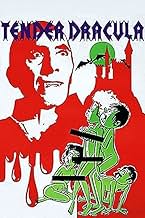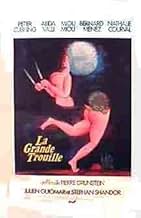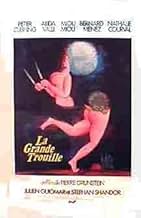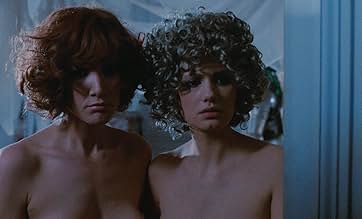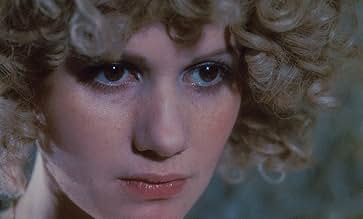अपनी भाषा में प्लॉट जोड़ेंTwo writers and their girlfriends visit the castle of an actor who specializes in playing vampire roles. As the night progresses, they begin to wonder if the man is an actor playing a vampir... सभी पढ़ेंTwo writers and their girlfriends visit the castle of an actor who specializes in playing vampire roles. As the night progresses, they begin to wonder if the man is an actor playing a vampire, or a vampire playing an actor.Two writers and their girlfriends visit the castle of an actor who specializes in playing vampire roles. As the night progresses, they begin to wonder if the man is an actor playing a vampire, or a vampire playing an actor.
Stéphane Shandor
- Boris
- (as Stephane Shandor)
Brigitte Borghese
- La Secrétaire du Producteur
- (as Brigitte de Borghese)
Robert Edwards
- MacGregor - as a Child
- (बिना क्रेडिट के)
फ़ीचर्ड समीक्षाएं
I recently watched the French 🇫🇷 horror-comedy Tender Dracula (1974) on the Full Moon app on Prime. The storyline follows a group of horror film stars at the end of their careers, as they attempt to transition into a new direction. The movie studio, unhappy with this change, sends two writers and their girlfriends to the actor's home, hoping to convince him to stick with horror. Upon arrival, they discover the actor has begun blending his real life with his cinematic persona. Can the writers change his mind before it's too late?
Directed by Pierre Grunstein in one of his few directorial projects, the film stars Peter Cushing (Horror of Dracula), Alida Valli (The Third Man), Bernard Menez (Dracula and Son), Miou-Miou (The Science of Sleep), and Julien Guiomar (Carmen).
The storyline is fun, and I enjoyed the concept of Hammer film-like stars facing their twilight years, with the studio trying to squeeze one last horror run out of them. This is a very different role for Peter Cushing, where he essentially parodies himself, donning Party City-level costumes and offering a light-hearted take on "Dracula." The women in the film are gorgeous, and it includes the typical '70s horror nudity. The props and kills are playful, and because the film doesn't take itself too seriously, it reminded me a bit of High Spirits. While the comedic elements are hit-or-miss, the corpse gags are fun, and the way the horror is woven into the comedy is entertaining.
In conclusion, Tender Dracula is far from one of Cushing's best, but it's something quite different. I would score this a 4/10 and recommend it only with the appropriate expectations.
Directed by Pierre Grunstein in one of his few directorial projects, the film stars Peter Cushing (Horror of Dracula), Alida Valli (The Third Man), Bernard Menez (Dracula and Son), Miou-Miou (The Science of Sleep), and Julien Guiomar (Carmen).
The storyline is fun, and I enjoyed the concept of Hammer film-like stars facing their twilight years, with the studio trying to squeeze one last horror run out of them. This is a very different role for Peter Cushing, where he essentially parodies himself, donning Party City-level costumes and offering a light-hearted take on "Dracula." The women in the film are gorgeous, and it includes the typical '70s horror nudity. The props and kills are playful, and because the film doesn't take itself too seriously, it reminded me a bit of High Spirits. While the comedic elements are hit-or-miss, the corpse gags are fun, and the way the horror is woven into the comedy is entertaining.
In conclusion, Tender Dracula is far from one of Cushing's best, but it's something quite different. I would score this a 4/10 and recommend it only with the appropriate expectations.
"Tendre Dracula," a 1974 film directed by Pierre Grunstein, is an eccentric attempt to blend horror and comedy, resulting in a curious yet ultimately flawed cinematic experience. The movie stars Peter Cushing as a retired horror film actor who lives in a secluded castle, embodying a peculiar charm that is both endearing and perplexing. Despite the intriguing premise, the execution falls short of its potential, leaving viewers with a mixed bag of amusement and frustration.
Cushing's portrayal of MacGregor, the actor who decides to live as the vampire character he once portrayed, is undoubtedly the film's highlight. His performance is both campy and sincere, providing a semblance of gravitas to an otherwise disjointed narrative. The supporting cast, including Alida Valli and Miou-Miou, deliver performances that range from entertaining to bewildering, adding to the film's uneven tone.
The plot of "Tendre Dracula" meanders through a series of absurd and often nonsensical scenarios. MacGregor invites two scriptwriters to his castle, ostensibly to help him write a new horror film. However, the writers soon find themselves caught in a bizarre game where the lines between fiction and reality blur. The film attempts to explore themes of identity and the nature of fear, but these are undermined by a lack of coherent storytelling and inconsistent pacing.
Visually, the film is a pastiche of Gothic horror and 1970s kitsch. The castle setting is appropriately atmospheric, with its dark corridors and candle-lit rooms providing a fitting backdrop for the film's eerie yet comedic tone. However, the cinematography lacks finesse, often feeling amateurish and failing to fully capitalize on the setting's potential. The special effects are rudimentary, which, while expected for the era, often detract from the film's intended horror elements.
The script is riddled with awkward dialogue and forced humor, leading to a series of moments that are more confusing than comedic. There are instances of clever satire and dark comedy, but these are sporadic and insufficient to sustain the film's intended mood. The humor often feels out of place, disrupting the balance between horror and comedy and resulting in a disjointed viewing experience.
Musically, "Tendre Dracula" features a score that is as erratic as its narrative. The soundtrack oscillates between eerie, suspenseful compositions and quirky, upbeat tunes that clash with the film's darker elements. This further contributes to the film's identity crisis, as it struggles to maintain a consistent tone.
Despite its numerous flaws, "Tendre Dracula" is not without its charms. There is a certain appeal in its audacious attempt to blend genres and its unabashedly quirky style. The film has moments of genuine creativity and offers a unique, albeit flawed, cinematic experience. However, these moments are overshadowed by poor execution and a lack of cohesive vision.
In conclusion, "Tendre Dracula" is a curious artifact of 1970s cinema that, while occasionally entertaining, ultimately fails to deliver on its promising premise. Its blend of horror and comedy is hampered by inconsistent storytelling, uneven performances, and a lack of technical polish. For those intrigued by the eccentricities of vintage horror-comedies, it may hold some appeal, but for most viewers, it is likely to be a disappointing watch.
Cushing's portrayal of MacGregor, the actor who decides to live as the vampire character he once portrayed, is undoubtedly the film's highlight. His performance is both campy and sincere, providing a semblance of gravitas to an otherwise disjointed narrative. The supporting cast, including Alida Valli and Miou-Miou, deliver performances that range from entertaining to bewildering, adding to the film's uneven tone.
The plot of "Tendre Dracula" meanders through a series of absurd and often nonsensical scenarios. MacGregor invites two scriptwriters to his castle, ostensibly to help him write a new horror film. However, the writers soon find themselves caught in a bizarre game where the lines between fiction and reality blur. The film attempts to explore themes of identity and the nature of fear, but these are undermined by a lack of coherent storytelling and inconsistent pacing.
Visually, the film is a pastiche of Gothic horror and 1970s kitsch. The castle setting is appropriately atmospheric, with its dark corridors and candle-lit rooms providing a fitting backdrop for the film's eerie yet comedic tone. However, the cinematography lacks finesse, often feeling amateurish and failing to fully capitalize on the setting's potential. The special effects are rudimentary, which, while expected for the era, often detract from the film's intended horror elements.
The script is riddled with awkward dialogue and forced humor, leading to a series of moments that are more confusing than comedic. There are instances of clever satire and dark comedy, but these are sporadic and insufficient to sustain the film's intended mood. The humor often feels out of place, disrupting the balance between horror and comedy and resulting in a disjointed viewing experience.
Musically, "Tendre Dracula" features a score that is as erratic as its narrative. The soundtrack oscillates between eerie, suspenseful compositions and quirky, upbeat tunes that clash with the film's darker elements. This further contributes to the film's identity crisis, as it struggles to maintain a consistent tone.
Despite its numerous flaws, "Tendre Dracula" is not without its charms. There is a certain appeal in its audacious attempt to blend genres and its unabashedly quirky style. The film has moments of genuine creativity and offers a unique, albeit flawed, cinematic experience. However, these moments are overshadowed by poor execution and a lack of cohesive vision.
In conclusion, "Tendre Dracula" is a curious artifact of 1970s cinema that, while occasionally entertaining, ultimately fails to deliver on its promising premise. Its blend of horror and comedy is hampered by inconsistent storytelling, uneven performances, and a lack of technical polish. For those intrigued by the eccentricities of vintage horror-comedies, it may hold some appeal, but for most viewers, it is likely to be a disappointing watch.
Tender Dracula is a combination horror film and French bedroom farce. It is one of Peter Cushing's least known films and for good reason. He plays a hammy actor who may or may not be a real vampire. Though Cushing is listed as the star, the film centers a lot more on the antics of two writers who visit Cushing's castle by the sea and the two girls they bring with them. There is a lot of nudity, some blood, some dream sequences and very little sense. It's like the makers want the viewer to puzzle over whether what is happening is real or not. By the end, the film becomes almost dream-like and makes no sense whatsoever. It's anybody's guess as to why Cushing signed on for this film. It is way beneath him. It's even beneath John Carradine!
1974's "Tender Dracula" was shot in France under the title "La Grande Trouille" (The Big Scare), purportedly a comedy, which may be the main reason why Peter Cushing chose to star, as 'High Priest of Horror' MacGregor, not a real vampire but an actor known for playing one, ala Christopher Lee. At the 16 minute mark, our introduction to him is a pleasant surprise, suitably attired in cape and fangs, but the relentless, unfocused insanity makes for a very unpleasant viewing experience. Alida Valli is the only other veteran in the cast, while the rest are cardboard ciphers of no interest whatsoever. As a sex farce, there are neither laughs nor thrills, as the two actresses are poorly made up, resembling a pair of bored drag queens. As for Peter Cushing, the role could have been much like Boris Karloff's Byron Orlok in "Targets," an icon who wants to abandon the genre that made him famous, but this lone directorial effort from prolific producer Pierre Grunstein offers no substance to support its star (there are photos from titles like "Tales from the Crypt" and "From Beyond the Grave," setting up a short sequence with Cushing playing his own gravedigger grandfather). It's a rare instance where Cushing can be said to be hammy, forgivable under the arduous circumstances, but his yearnings to free himself from 'horror' to 'romance' come off as very real, the lone 'truth' amid so much that's false ("she's not afraid of growing old, she's in love. Love is ageless, and because she is in love, she is pure. All things from above are peaceful, gentle, and pure"). Christopher Lee would have his chance in 1976's "Dracula and Son," in which he did indeed play a real vampire, just not Dracula.
Peter Cushing in a vampire movie. Sound good? Yes I thought so too...until I saw Tender Dracula. This is a French film and comes across as something like an arty Hammer Horror flick. The plot focuses on two writers. They go on a trip with their girlfriends (who both look like men in drag) and end up at the castle of an aging actor. He is famous for portraying vampires on screen; but as the night progresses, the group begins to wonder if the man is really acting when he is on screen. The film basically consists of eighty five minutes of boring dialogue and as you can probably imagine; it gets boring quickly. The copy I saw was of really poor quality; but in spite of that it's clear that the film doesn't utilise any particularly interesting locations which helps to make it more of a dull experience. The title, 'Tender Dracula' lead me to believe that it might be some sort of soft-core porn outing, but there's no sex or nudity in the film and the title is quite inappropriate. I'd hesitate even to call this a horror film really since there's no actual horror in it. Tender Dracula is a 'lost' film, and really that is for good reason and I doubt it will be resurfacing any time soon!
क्या आपको पता है
- ट्रिवियाFor the original French version, Der Student von Prag (1935) was dubbed by Jean Rochefort..
- कनेक्शनReferences यह बाहरी अंतरिक्ष से आया है (1953)
- साउंडट्रैकPlay the Devil
Written by Harold Brav, Justin Lenoir, Karl-Heinz Schäfer
Performed by Alida Valli, Peter Cushing
टॉप पसंद
रेटिंग देने के लिए साइन-इन करें और वैयक्तिकृत सुझावों के लिए वॉचलिस्ट करें
- How long is The Big Scare?Alexa द्वारा संचालित
विवरण
- चलने की अवधि1 घंटा 38 मिनट
- ध्वनि मिश्रण
इस पेज में योगदान दें
किसी बदलाव का सुझाव दें या अनुपलब्ध कॉन्टेंट जोड़ें


